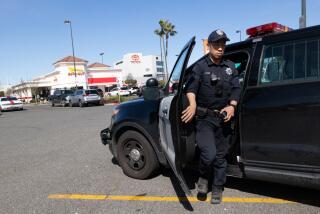Justices to Review Police ‘Narcotics Checkpoints’
- Share via
WASHINGTON — The Supreme Court, which already has given law enforcement broad powers to fight the war on drugs, agreed Tuesday to consider reviving a police policy of using routine roadblocks to check for narcotics.
A case from Indianapolis, to be heard in the fall, is the first to test the constitutionality of “narcotics checkpoints.”
If the city prevails, local and state police will have the option of using these roadblocks widely or just in high-crime areas.
Police say the impact on innocent motorists is minimal. They are stopped and questioned for several minutes while a drug-sniffing dog circles the vehicle. If the motorist is alert and no drugs are found, the car is sent on its way, officials said.
During the summer of 1998, police in Indianapolis set up these drug roadblocks at several locations around the city. Police said 9% of the stops resulted in an arrest.
But the drug roadblocks were challenged by two motorists as a violation of their 4th Amendment rights against unreasonable searches and seizures. Last year, the U.S. Court of Appeals in Chicago agreed in a 2-1 vote and declared the policy unconstitutional.
Police may stop cars for safety reasons, such as detecting drunk drivers, wrote Judge Richard Posner. But since the drug roadblocks do not involve highway safety, but rather are a search for criminal evidence, a policy of randomly searching innocent persons is unconstitutional, he concluded. A renowned antitrust expert, Posner is now mediating the dispute between Microsoft and the Justice Department.
In their appeal, lawyers for Indianapolis noted that the high court in the past had upheld “sobriety roadblocks” as well as the immigration checkpoint on Interstate 5 north of San Diego. In both instances, innocent persons are stopped briefly. Narcotics checkpoints are similar and also should be upheld, they argued.
In a brief order, the Supreme Court announced Tuesday it will hear the case of City of Indianapolis vs. Edmond, 99-1030.
Since the mid-1980s, the court regularly has sided with law enforcement in drug cases. For example, the justices upheld the use of “drug courier profiles,” which are used as a basis to stop people in airports and train depots.
Four years ago, the court ruled that police can use minor traffic offenses, such as failing to stop completely at a stop sign, as a pretext to pull over a vehicle to search for drugs. Once the car is stopped, the police can force the motorist and passengers to step out and then search the entire vehicle.
Critics say that thanks to these rulings, the police power to enforce traffic laws has been transformed into a general police power to search for drugs on the roadways. Moreover, this search authority has been used disproportionately against black and Latino motorists, civil libertarians say.
In other actions Tuesday, the court:
* Agreed to decide whether a state high school athletic association can prohibit private schools from recruiting star athletes.
The legal question before the court tests whether these regulatory bodies are private or public. If they are public, then the regulators must abide by the Constitution, including its guarantee of freedom of speech.
The Tennessee Secondary School Athletic Assn. says it is a private group, even though most of its members are public high schools. The Brentwood Academy, a football powerhouse in Memphis, says it has a free-speech right to recruit student athletes. The outcome in the case of Brentwood Academy vs. TSSAA, 99-901, could broadly affect the regulation of school sports.
* Heard arguments in the continuing tax fraud prosecution of Webster L. Hubbell, the former associate of the Clintons and a onetime high-ranking Justice Department official. The case is one of several begun by Whitewater independent counsel Kenneth W. Starr, who resigned recently.
After Hubbell was given immunity and ordered to turn over his business records, Starr’s office indicted him for tax fraud.
In skeptical questioning Tuesday, the justices called Starr’s actions “deceptive” and said they signaled “prosecutorial overreaching.” A ruling in U.S. vs. Hubbell, 99-166, will be handed down by July.
More to Read
Sign up for Essential California
The most important California stories and recommendations in your inbox every morning.
You may occasionally receive promotional content from the Los Angeles Times.














